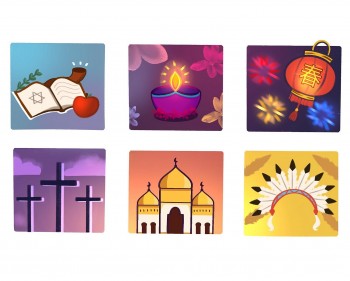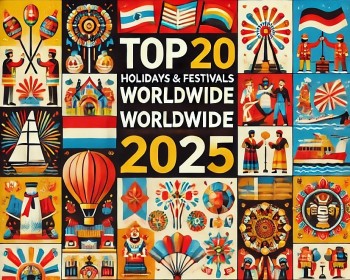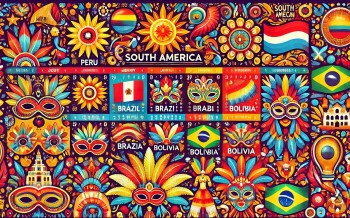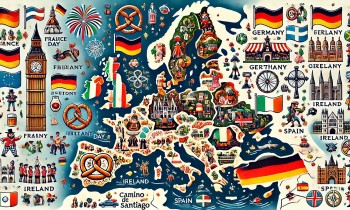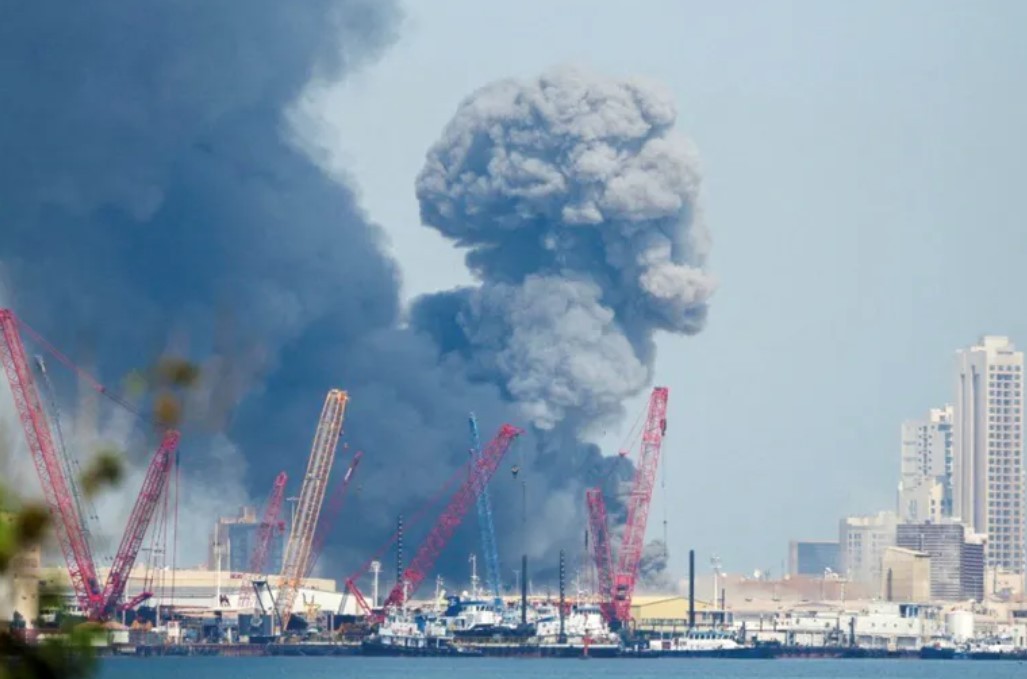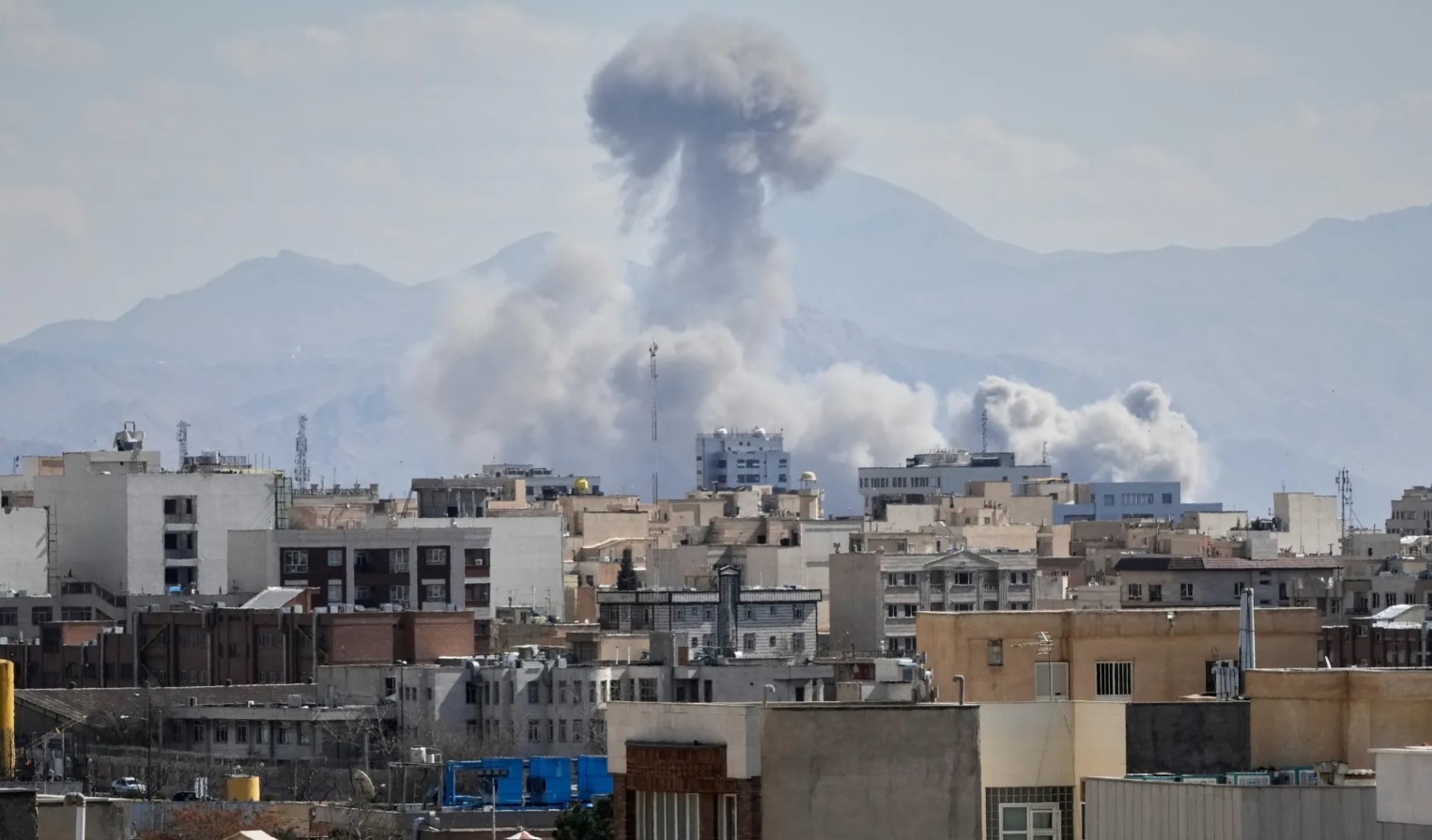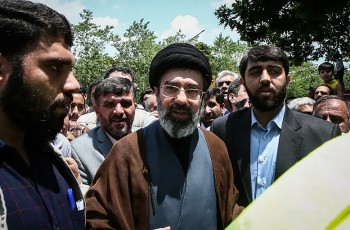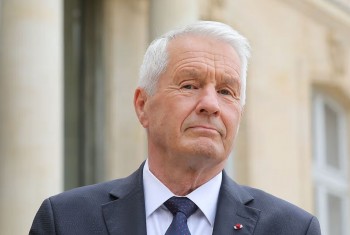Pakistan Calendar 2025 - Public, Regional, Religious Holidays: Significances And Celebrations
An Overview of Holidays in Pakistan
Holidays in Pakistan reflect the country’s rich heritage, religious devotion, and diverse cultural landscape. As an Islamic republic, Pakistan’s holiday calendar includes a range of Islamic festivals, national celebrations, and regional holidays specific to various provinces. These holidays provide not only time off work but also an opportunity for communities to unite in celebration, reflection, and respect for their cultural and historical roots.
In Pakistan, holidays fall into five primary categories:
Public Holidays: Nationwide holidays on which government offices, schools, and most businesses close.
Religious Holidays: Holidays based on Islamic events, observed across the country with religious ceremonies and gatherings.
Bank Holidays: Specific days when banks close, impacting financial transactions and business operations.
Regional Holidays: Holidays specific to certain provinces or regions, celebrating local culture, heritage, and historical events.
International/Unofficial Holidays: Despite not being national holidays, these days are widely recognized as social and cultural events, especially among urban and younger populations. These holidays allow people to celebrate relationships, express culture, and participate in global traditions.
I. National Public Holidays in Pakistan 2025
The government of Pakistan declares national holidays to honor significant occurrences in the country's history. These holidays are celebrated across the country and bring Pakistanis together to honor their collective heritage.
1. Pakistan Day (March 23)
Pakistan Day is celebrated on March 23 to commemorate the Lahore Resolution, passed in 1940, which called for the establishment of an independent state for Muslims in British India. This resolution became the foundation for the creation of Pakistan, eventually leading to independence in 1947.
- Significance: The day holds great historical importance as it symbolizes Pakistan’s journey toward sovereignty.
- Celebrations: Pakistan Day is marked with flag-raising ceremonies, military parades in Islamabad, and speeches by national leaders. Cities are decorated, and patriotic songs are played nationwide, fostering a sense of unity and pride.
Learn more: The Top 10 Most Gorgeous Pakistani Women
2. Labour Day (May 1)
Labour Day, celebrated worldwide, honors the contributions of workers and emphasizes their rights. In Pakistan, it is a public holiday dedicated to recognizing laborers' struggles and promoting fair working conditions.
- Significance: Labour Day reflects Pakistan’s commitment to workers' rights and fair labor practices.
- Traditions: Various labor unions organize rallies, seminars, and gatherings to advocate for workers' welfare and promote awareness of labor rights.
3. Independence Day (August 14)
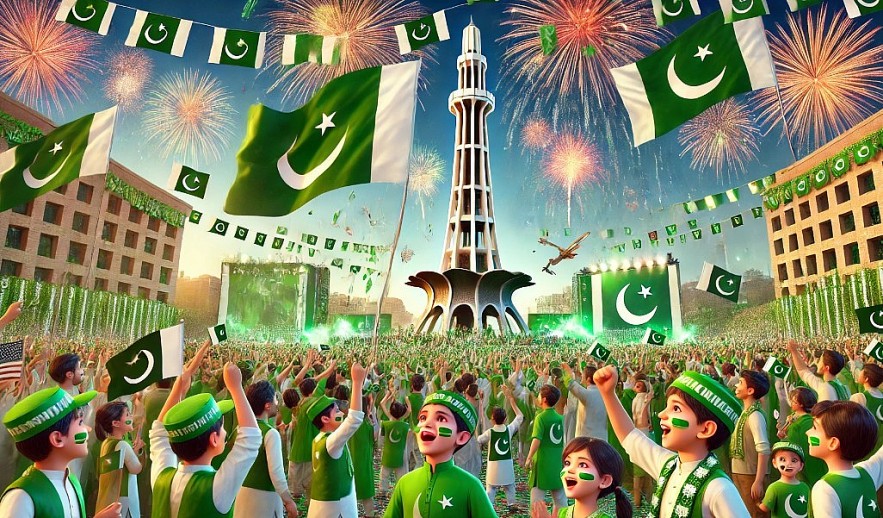 |
| The spirit of Pakistan’s Independence Day |
Independence Day marks Pakistan's freedom from British rule in 1947. On August 14, Pakistanis celebrate their independence and honor those who sacrificed their lives to establish the country.
- Historical Context: Independence Day commemorates the partition of British India and the formation of an independent state for Muslims, achieved through the leadership of Muhammad Ali Jinnah.
- Celebrations: Across Pakistan, people celebrate with flag-raising ceremonies, cultural events, and firework displays. Patriotic songs, speeches, and school programs reflect the nation’s pride. The day is also marked by a military parade in Islamabad, featuring performances and displays by Pakistan's armed forces.
4. Iqbal Day (November 9)
Iqbal Day is observed to honor Allama Muhammad Iqbal, the philosopher and poet who envisioned the idea of a separate homeland for Muslims in the Indian subcontinent.
- Significance: As a celebrated poet and thinker, Iqbal’s ideas laid the intellectual groundwork for Pakistan.
- Observance: Schools, universities, and literary societies hold events to discuss Iqbal’s poetry, philosophy, and the legacy he left for future generations.
5. Quaid-e-Azam Day (December 25)
Quaid-e-Azam Day marks the birthday of Pakistan’s founding father, Muhammad Ali Jinnah, known as Quaid-e-Azam, or "The Great Leader."
- Significance: Jinnah’s leadership and vision were instrumental in creating an independent Pakistan.
- Celebrations: The day is commemorated with ceremonies, documentaries, and speeches highlighting Jinnah’s life and contributions. People visit the Quaid’s mausoleum in Karachi to pay respects, and patriotic programs on television focus on his legacy.
National holidays such as these are crucial for fostering unity, encouraging patriotism, and providing opportunities for Pakistanis to reflect on their shared history and cultural values.
II. Religious Holidays in Pakistan 2025
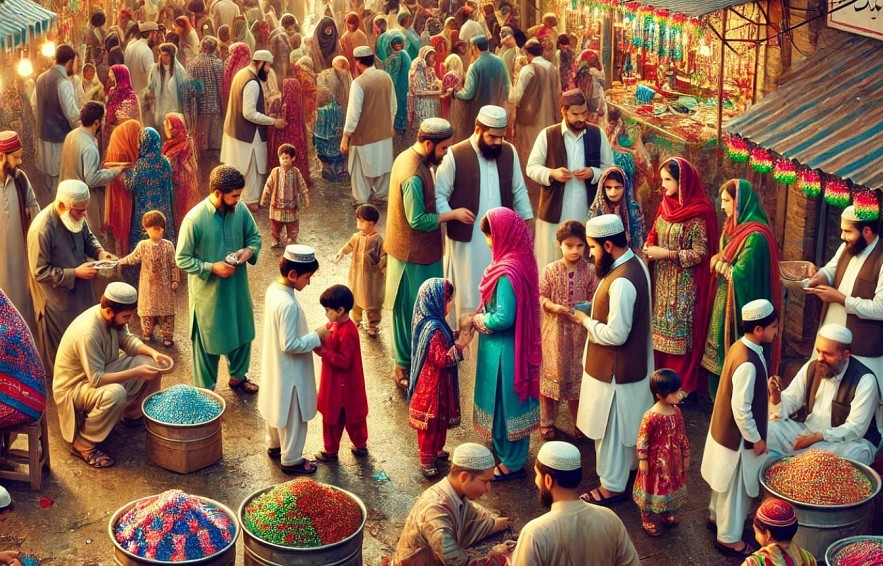 |
| The vibrant festivities of Eid, showing families in colorful attire, children receiving "Eidi," and people sharing traditional sweets |
Religious holidays in Pakistan are based on the Islamic lunar calendar and have significant cultural and spiritual importance. As an Islamic republic, Pakistan observes all major Islamic festivals, which are celebrated with devotion and community gatherings.
1. Eid-ul-Fitr
Eid-ul-Fitr, known as the "Festival of Breaking the Fast," marks the end of Ramadan, a month of fasting and spiritual reflection.
- Significance: Eid-ul-Fitr is a celebration of the spiritual growth achieved during Ramadan.
- Traditions: The holiday begins with special prayers at mosques, followed by feasts with family and friends. Children receive "Eidi" (gifts or money), and people give charity (Zakat-ul-Fitr) to ensure everyone can celebrate.
2. Eid-ul-Adha
Eid-ul-Adha, the "Festival of Sacrifice," commemorates Prophet Ibrahim’s willingness to sacrifice his son in obedience to Allah.
- Religious Importance: Eid-ul-Adha is a reminder of faith, obedience, and sacrifice.
- Celebrations: Families perform Qurbani (animal sacrifice) and distribute the meat to family, friends, and the less fortunate. The holiday is marked by communal prayers and gatherings, with a focus on sharing and compassion.
3. Ashura (9th and 10th of Muharram)
Ashura is observed in remembrance of the martyrdom of Imam Hussain, the grandson of Prophet Muhammad (PBUH), during the Battle of Karbala.
- Significance for Shia and Sunni Muslims: While Shia Muslims mark the day with mourning and processions, Sunni Muslims fast in remembrance of Prophet Musa (Moses).
- Observances: In cities like Karachi and Lahore, Shia processions involve recitations, prayers, and symbolic reenactments, reflecting the historical and religious significance of Imam Hussain's sacrifice.
4. Milad-un-Nabi (12th of Rabi-ul-Awwal)
Milad-un-Nabi, the birthday of the Prophet Muhammad (PBUH), is celebrated with reverence and joy across Pakistan.
- Religious Importance: Milad-un-Nabi is a day to honor the life and teachings of the Prophet.
- Celebrations: Cities and mosques are decorated with lights, and processions and gatherings are held where sermons are given, and nasheeds (religious songs) are recited.
Religious holidays serve to strengthen the spiritual bond within the Muslim community and encourage acts of charity, reflection, and prayer.
III. Bank Holidays in Pakistan
Bank holidays are designated days when banks are closed but not all businesses observe these as official holidays. Bank holidays are essential to allow employees in the financial sector a break and are often observed on key public and religious holidays.
Key Bank Holidays in 2025
- New Year’s Day (January 1): The beginning of the new calendar year is a bank holiday in Pakistan.
- Eid Holidays (Eid-ul-Fitr, Eid-ul-Adha): Banks close during Eid to allow employees to fully partake in religious celebrations.
- Independence Day (August 14): Banks observe this day along with the rest of the nation, closing to honor Pakistan’s independence.
Bank holidays in Pakistan are essential for aligning the financial sector with national observances and ensuring that bank employees have time off during key celebrations.
IV. Regional Holidays in Pakistan
Regional holidays are celebrated in specific provinces or territories, reflecting the unique heritage and culture of Pakistan’s diverse ethnic groups. These holidays provide an opportunity for different communities to honor their cultural traditions and share them with the rest of the country.
Notable Regional Holidays in 2025
-
Sindh Culture Day (Sindh Province): Celebrated across Sindh, this day honors the Sindhi language, music, and traditional attire, with events showcasing Sindhi dance, poetry, and handicrafts.
-
Baloch Cultural Day (Balochistan Province): Baloch Cultural Day celebrates the rich heritage of Balochistan with folk music, traditional dress, and cultural exhibitions.
-
Khyber Pakhtunkhwa Festival Days (KP Province): In KP, various festivals celebrate the Pashtun culture, with activities like traditional sports, music, and dance.
-
Gilgit-Baltistan Independence Day: This day commemorates the liberation of Gilgit-Baltistan and is celebrated with parades, sports competitions, and cultural performances.
Regional holidays allow ethnic groups in Pakistan to take pride in their distinct cultural identities and promote understanding and unity within the broader national context.
V. Other Observances and Unofficial Holidays
1. New Year’s Eve (December 31)
New Year’s Eve is an unofficial celebration in Pakistan, particularly in urban centers like Karachi, Lahore, and Islamabad. As the clock approaches midnight, people gather for celebrations, often accompanied by fireworks and festivities.
- Celebrations: Families and friends organize gatherings and countdown parties. In cities, public places such as parks and hotels host events, while restaurants offer special dinners and packages. Fireworks displays in places like Clifton Beach, Karachi, and other popular areas mark the occasion.
- Cultural Significance: While not a traditional holiday, New Year’s Eve has become an opportunity for people to reflect on the past year and celebrate new beginnings, bringing together communities in a festive atmosphere.
2. Valentine’s Day (February 14)
Valentine’s Day has become increasingly popular among young people and urban residents in Pakistan, despite it not being an official holiday. It is a day dedicated to expressing love and appreciation between couples, friends, and family members.
- Celebrations: Florists, cafes, and restaurants see a surge in business on this day as people buy flowers, gifts, and chocolates for their loved ones. Many couples celebrate by going out to dinner or exchanging small tokens of affection.
- Social Response: Valentine’s Day celebrations have sparked some debate within the country, with conservative groups calling for the preservation of traditional values. Despite this, Valentine’s Day is widely celebrated, especially among the younger generation.
3. Mother’s Day (Second Sunday in May)
Mother’s Day, celebrated globally, is dedicated to honoring mothers and mother figures for their role in families and society. It is observed with enthusiasm in Pakistan, though it is not an official public holiday.
- Traditions: Children express appreciation for their mothers through gifts, flowers, and cards. Family gatherings are common, and many people take their mothers out for a special meal or arrange home-cooked dinners to show their gratitude.
- Significance: Mother’s Day highlights the value placed on family in Pakistani society, strengthening bonds and appreciation within families.
4. Father’s Day (Third Sunday in June)
Father’s Day is also celebrated in Pakistan, providing an opportunity to recognize and honor fathers and father figures for their contributions.
- Celebrations: Similar to Mother’s Day, children present gifts, cards, or spend time with their fathers to show their appreciation. It has become popular among families in urban areas.
- Cultural Impact: Although not as widely celebrated as Mother’s Day, Father’s Day is gaining popularity, especially among young families.
5. Earth Day (April 22)
Earth Day has gradually become an important day in Pakistan, particularly among environmental groups, NGOs, and schools. This day is dedicated to raising awareness about environmental issues, including pollution, deforestation, and climate change.
- Activities: Schools and environmental organizations often organize tree-planting activities, clean-up drives, and workshops to promote eco-friendly practices. Government and NGO campaigns are often held to raise public awareness of environmental protection.
- Significance: As Pakistan faces environmental challenges, Earth Day serves as a reminder of the importance of sustainability and environmental conservation efforts.
6. Defense Day (September 6)
While Defense Day is not a public holiday, it is widely observed by Pakistanis to honor the armed forces and commemorate their role in the 1965 war with India.
- Observances: Military parades, exhibitions, and special events at schools and institutions mark this day. The media broadcasts documentaries, interviews with veterans, and historical programs to honor the bravery of Pakistan’s military personnel.
- Public Engagement: Though not a holiday, Defense Day holds immense respect, particularly among those associated with the armed forces and those commemorating the sacrifices of military personnel.
These unofficial holidays offer Pakistanis additional ways to come together, celebrate relationships, and participate in global observances, adding a contemporary layer to the traditional holiday calendar. They have grown in significance over the years and continue to reflect the cultural evolution and diverse influences shaping Pakistani society today.
In Conclusion
The holidays celebrated across Pakistan are as diverse as the country’s people, reflecting a blend of national pride, religious devotion, and cultural traditions. Whether it’s through commemorating the achievements of national leaders, celebrating the principles of Islamic faith, or honoring regional identities, these holidays are integral to Pakistan’s social fabric. They bring communities together, foster cultural pride, and allow Pakistanis to honor their history, religion, and traditions.
FAQs
1. Are all religious holidays in Pakistan observed as public holidays?
Yes, most major Islamic religious holidays, such as Eid-ul-Fitr, Eid-ul-Adha, and Ashura, are public holidays in Pakistan, allowing citizens to fully participate in the celebrations.
2. How are the dates for Islamic holidays determined in Pakistan?
Islamic holidays are based on the lunar Islamic calendar, so their dates shift each year. The sighting of the moon officially determines the dates for holidays like Eid-ul-Fitr and Eid-ul-Adha.
3. Do regional holidays affect the whole country?
No, regional holidays are specific to certain provinces and typically do not impact national business or government closures. For example, Sindh Culture Day is primarily celebrated in the Sindh province.
4. Why are bank holidays different from public holidays?
Bank holidays primarily affect banks and the financial sector, while public holidays apply to all sectors. Bank holidays ensure that employees in the financial sector get time off during key events.
5. How many national public holidays does Pakistan observe each year?
Pakistan typically observes around five national public holidays annually, including Pakistan Day, Independence Day, Labour Day, Iqbal Day, and Quaid-e-Azam Day.
6. Is it common for new holidays to be introduced in Pakistan?
While rare, additional holidays may be introduced or adjusted based on government policy or significant national events. Most of the holiday calendar remains consistent year to year.

